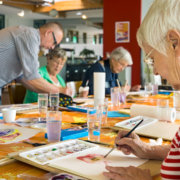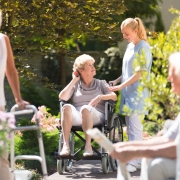The Healing Power of Art: Exploring Creative Therapies in Memory Care Assisted Living | Ashland NE
In the world of memory care, where senior adults grappling with cognitive issues find the care and support that they need, bearing the challenges of cognitive decline for seniors in memory assisted living Ashland, NE, can still be overwhelming.
Despite the availability of treatments, some aspects may not be directly addressed, such as senior residents’ mental and physical well-being. However, the good thing despite these difficulties is the availability of a therapeutic approach through the arts.
Let us explore the positive impacts of creative approaches in terms of how these can improve the overall quality of life for those with cognitive impairments.
The Healing Power of Art
Art creates visually appealing works and expresses ideas through music, writing, or dance. It has been around for thousands of years and has evolved. Art in different forms is a medium to tell stories and stir emotions.
Art is said to have a powerful effect on people with memory or cognitive issues. Music, visual, and performing arts can provide inspiration, hope, and a sense of purpose even with cognitive challenges. Art has the power to foster that sense of belongingness while at the same time providing a means for emotional release that is hard to express through words.
The act or creation of art creates a connection between individuals, including caregivers, assisted living Ashland NE, families, and fellow residents. This can be very helpful for residents experiencing loneliness and isolation. Art can make an individual stay focused and present in the moment.
Whether you are an artist or appreciate art, it can reduce the signs of stress and anxiety, process emotions, and improve overall well-being.
The Science Behind Art and Happiness
Being diagnosed with Alzheimer’s or any form of dementia can be heartbreaking for families and senior adults. Other than that, caring for loved ones with this progressive disease can be a struggle.
Some studies reveal convincing benefits for patients with memory loss. First, artistic activities are said to trigger the release of dopamine, an organic chemical that gives the feeling of satisfaction, happiness, and motivation. Moreover, engaging in art activities, whether music, painting, or other forms of visual arts, allows patients with memory loss to convey emotions, allowing them to feel that renewed sense of self-worth.
Group art activities allow patients to create meaningful interactions with their co-residents, families, and caregivers. In turn, this can reduce feelings of loneliness, depression, and isolation. It allows individuals to create new memories, allowing people with dementia to remember they created these masterpieces.
The arts help people with dementia reduce signs of agitation and irritability. Creating art allows them to be more focused and relaxed. Whether through writing, painting, or drawing, stress levels can be lower, and quality of life can improve.
Art Therapy in Memory Assisted Living Ashland NE
In memory assisted living Ashland NE, art therapy is a great tool for promoting the overall well-being of patients with Alzheimer’s or dementia. Residents can express themselves through artistic expression, create new memories, and easily connect with others.
Art can stimulate the different areas of the brain. This can slow cognitive decline while producing happy hormones, reducing anxiety, and providing a sense of self-worth and a renewed sense of purpose.
Group art sessions in memory assisted living in Ashland, NE, promote a better sense of community by encouraging group efforts and sharing. This reduces the feelings of wanting to be alone and isolated, which are commonly associated with memory loss.
Overall, art therapy is not just about its aesthetic appeal. It’s also about providing a holistic approach to the emotional, mental, and social needs of individuals with memory loss. By discovering the power of art, residents in memory care can find joy, a sense of connection, and belonging.
Click here to learn more about Richmont Senior Living!
Richmont Senior Living is proud to serve Ashland, NE and the surrounding cities: Memphis, Springfield, South Bend, Greenwood, Murdock, Waverly, Murdock, Ithaca, and Chalco






